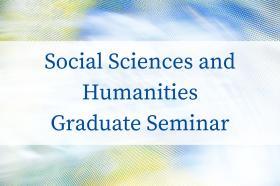
The Social Sciences and Humanities Graduate Seminar will take place on Wednesday 26 November at 6pm in the Simpkins Lee Lecture Theatre. There will be drinks in the Monson Room afterwards.
The speakers will be:
Isabella Falconer: Satire and Subversion in LMH’s The Barnacle
“The Barnacle is a multi-volume manuscript magazine produced by ‘The Gosling Society’, a group of teenage girls who formed an intellectual coterie in 1859 in response to their exclusion from formal education. Christabel Coleridge, the granddaughter of Samuel Taylor Coleridge and one of the founding members, recalled that for them, ‘Education was often desultory, and High Schools had not yet been thought of’. To provide the group with literary authority, Charlotte Mary Yonge – by then a successful novelist of over a decade – was appointed to assume the role of ‘Mother Goose’. The Barnacle became the medium through which the Goslings regularly disseminated their various academic and literary pursuits amongst the ‘Brood’, fostering a culture of intellectual exchange and collective self-education. The Barnacle is now held in LMH, due to Yonge’s connection with Elizabeth Wordsworth, the founding Principal of the college.
The Goslings chose to manage every stage of The Barnacle’s production, including editing, binding, and circulation, despite having the means to outsource these tasks. In doing so, they deliberately created a miniature, exclusively female counterpart to the publishing industry. Not only was this remarkable in itself, but the privacy of their circle also enabled the Goslings to engage openly in satire, commenting on and destabilising the evaluative hierarchies of nineteenth-century print culture and their exclusionary gender roles. The Barnacle thus stands as a ground-breaking record of the authentic and radical expressions of Victorian girls who forged a countercultural alternative to both formal education and the proliferation of print in the nineteenth century.
Since The Barnacle is a relatively obscure and inaccessible manuscript, I intend to open with a largely factual description of the work and the context of its creation, before exploring the forms of subversion and satire it embodies – including its visual imagery, its distinctive method of production, and the ways in which it disrupts the boundaries between print and manuscript circulation.”
Motema Letlatsa: The Lionesses in dresses: Can Basotho girls really learn science?
“This study, influenced by the premises that a) “…the notion that being (ontology) importantly shapes what and how we know (epistemology” (Heybach and Pickup, 2017, p.615) and b) Basotho beliefs around the strength and responsibility of women, explores how women secondary school science teachers navigate and negotiate school science under policy and school level pressures, the pedagogical choices they make and the influences directing choices. This ongoing work is inspired by studies from black feminist, afro-feminist and decoloniality scholarship.”